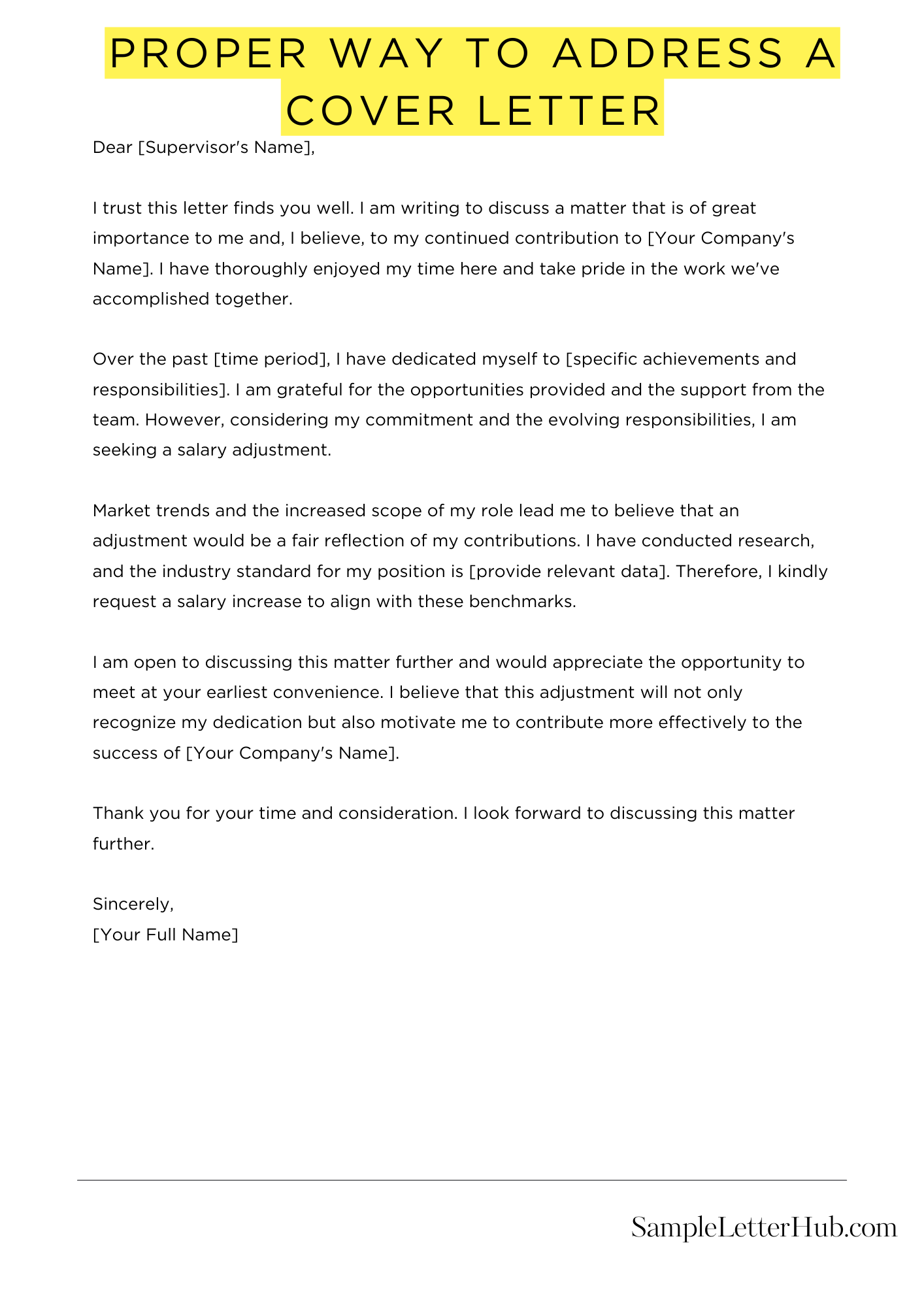Proper Way To Address A Cover Letter is a guide that provides you with the correct format and etiquette for addressing a cover letter. It ensures that your letter makes a professional and positive first impression on the hiring manager.
In this article, we will share templates, examples, and samples of Proper Way To Address A Cover Letter. These samples will help you craft a well-written and effective cover letter that will increase your chances of getting noticed by potential employers.
By following the tips and using the samples provided in this article, you can write a cover letter that will stand out from the crowd and help you land your dream job.
The Art of Crafting a Compelling Cover Letter Salutation
Dear [Hiring Manager Name or Title],
I am writing to express my keen interest in the [Position Name] position at [Company Name]. With my proven track record in [Relevant Industry or Field] and a deep understanding of your company’s mission and values, I am confident that I possess the skills and experience to excel in this role.
When addressing a cover letter, it is crucial to strike the right balance between formality and personalization. The salutation sets the tone for your letter and can make a lasting impression on the hiring manager. Here are some guidelines to help you craft an effective salutation:
* **Use a formal greeting:** Begin with a professional salutation such as “Dear Mr./Ms. [Last Name]” or “Dear Hiring Manager.” Avoid using informal greetings like “Hi” or “Hello.”
* **Research the hiring manager’s name:** If possible, take the time to research the name of the hiring manager. This demonstrates your attention to detail and shows that you have taken the time to learn about the company.
* **If the hiring manager’s name is unknown:** Use a generic salutation such as “Dear Hiring Manager” or “Dear [Department Name] Hiring Team.”
* **Avoid using titles without a name:** Do not address the letter to “To Whom It May Concern” or “Dear Sir/Madam.” These salutations are impersonal and can make your letter seem less professional.
By following these guidelines, you can create a cover letter salutation that is both respectful and engaging. Remember, the salutation is just the first step in crafting a compelling cover letter that will capture the attention of the hiring manager and increase your chances of securing an interview.

How to Write the Proper Way to Address a Cover Letter
Writing a cover letter is an important part of the job application process. It is your chance to introduce yourself to the hiring manager and show them why you are the best candidate for the job. One of the most important things to get right in your cover letter is the salutation, or the way you address the hiring manager.
Use a Formal Salutation
The most common way to address a hiring manager in a cover letter is to use a formal salutation, such as “Dear Mr./Ms. Last Name.” If you do not know the hiring manager’s name, you can use a more general salutation, such as “Dear Hiring Manager.” Avoid using informal salutations, such as “Hi” or “Hello.”
Research the Company
Before you send your cover letter, take some time to research the company. This will help you determine the appropriate way to address the hiring manager. For example, if the company is a large corporation, you may want to use a more formal salutation, such as “Dear Mr./Ms. Last Name.” If the company is a small business, you may be able to use a more informal salutation, such as “Dear [First Name].”
Use the Correct Title
When you address the hiring manager, be sure to use the correct title. If you are not sure what the hiring manager’s title is, you can check the company’s website or LinkedIn profile. If you are still unsure, you can use a more general title, such as “Manager” or “Director.”
Avoid Using Gendered Language
In today’s business world, it is important to avoid using gendered language in your cover letter. This means avoiding using terms such as “Mr.” or “Ms.” If you do not know the hiring manager’s gender, you can use a more gender-neutral salutation, such as “Dear [Last Name].”
Be Consistent
Once you have chosen a salutation, be consistent throughout your cover letter. Do not use a different salutation in the body of your letter than you did in the opening paragraph.
Proofread Carefully
Before you send your cover letter, be sure to proofread it carefully for any errors. This includes checking for errors in grammar, spelling, and punctuation. You should also make sure that you have used the correct salutation.
By following these tips, you can ensure that you address the hiring manager in a professional and respectful manner. This will help you make a good first impression and increase your chances of getting the job.
FAQs about Proper Way To Address A Judge
1. What is the proper way to address a judge in court?
The proper way to address a judge in court is “Your Honor.” This is a sign of respect for the judge’s position and authority. You should also stand when you address the judge.
2. What is the proper way to address a judge in writing?
The proper way to address a judge in writing is “The Honorable [Judge’s last name].” You should also include the judge’s title, such as “Judge” or “Justice.” For example, you would address a letter to a judge as “The Honorable John Smith, Judge.”
3. What is the proper way to address a judge in person?
The proper way to address a judge in person is “Your Honor.” You should also stand when you address the judge. If you are meeting the judge for the first time, you should introduce yourself and state your purpose for being there.
4. What is the proper way to address a retired judge?
The proper way to address a retired judge is “Judge [Judge’s last name].” You should also include the judge’s title, such as “Judge” or “Justice.” For example, you would address a letter to a retired judge as “Judge John Smith, Ret.”
5. What is the proper way to address a judge’s staff?
The proper way to address a judge’s staff is “Mr./Ms. [Staff member’s last name].” You should also be respectful and courteous to the judge’s staff.

